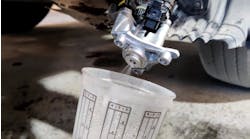ExxonMobil uses NASCAR to highlight fleet best-in-class lubrication strategies
ExxonMobil has launched “Mission: Unstoppable,” a Mobil Delvac-branded campaign that shines a light on how best-in-class lubrication strategies help drive success for America’s trucking fleets, including for NASCAR’s Stewart-Haas Racing (SHR) team.
The campaign, which dives deep into how Mobil Delvac solutions have helped SHR’s fleet improve team performance and extend oil change intervals, explores a core truth: whether the goal is to grow your fleet business or win races, high-performance fleets and motorsports teams both need one thing—engines running at peak performance, delivering unstoppable results.
With the help of Mobil Delvac products and services, the SHR fleets have found ways to improve uptime and performance, helping the racing team win multiple NASCAR Drivers’ Championships and support the careers of racing legends such as Tony Stewart, Kevin Harvick, Clint Bowyer, Danica Patrick, Aric Almirola, and more. Since 2011, ExxonMobil and SHR have worked together on two Cup series championships and nearly 100 Cup wins.
SHR haulers transport nearly 80,000 lbs. of equipment each—from spare engines and parts to the race cars.
“We’ve been using Mobil Delvac for over ten years in all our heavy-duty diesel trucks here at Stewart-Haas,” explains Gary Geissman, SHR fleet manager in a six-minute documentary-style video shot as the crew prepared for the Talladega GEICO 500 Cup Series NASCAR race in April 2022. “In our fleet, we used to change the oil every 20,000 miles. We now change it every 70,000 miles – there’s less downtime for us, and a lot more time to chase the checkered flag.”
SRH performs monthly lubricant analysis, sending the samples from the haulers' Cummins X15 engines to ExxonMobil. The interval extension was endorsed by Cummins.
By using Mobil Delvac Extreme 10W-30 high performance diesel engine oil Texas Transportation Company, which has extended the oil drain intervals for their Detroit Diesel engines from 50,000 to 70,000 miles and saved $734,000 annually. Texas Transportation cut labor to perform the oil drains by 475 hours annually, as well.
Nussbaum Transportation has also reported extending oil drain interval time by 50% with Mobil Delvac Extreme 10W-30.
BSA Trucking found switching to Mobil Delvac 1300 Super allowed that fleet’s Cummins ISX15 engine to receive oil drains at 75,000 miles, as opposed to 20,000 miles.
Watch the video:
“Winning fleets know that every opportunity to increase uptime, reduce labor costs, and free up technician time for other tasks can be a significant advantage for their business,” said Paul Cigala, commercial vehicle lubricants applications engineer for ExxonMobil. “In ‘Mission: Unstoppable,’ we showcase how Mobil Delvac products and services can be a secret ingredient in fueling success for fleets of all sizes–put simply, it can be the ‘unstoppable’ advantage they need to grow their business even further.”




